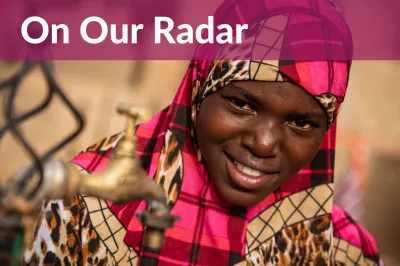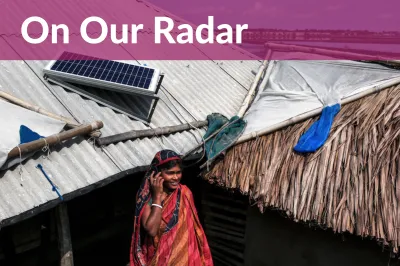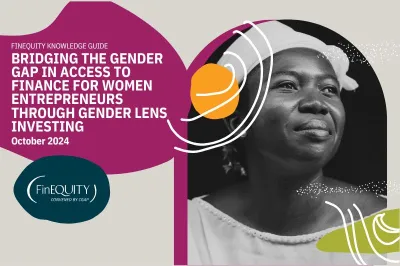Why Does She Behave the Way She Does? - Key Takeaways from the Tools Workshop

“Very few women would take the decision to scale-up [a business]. They wouldn’t as they’re scared of the financial consequences. Women lack support to take risk.”
“My husband expects that all of the money is in his name and nothing in my name. A lot of my women friends work, but all of their income is automatically transferred to their husband’s account.”
“When women start businesses, the community waits to see the business fail and use her as an example that women cannot start or manage a business.”
Personas, a popular human-centered design tool that has gained traction in the financial inclusion sector, is used to understand the needs and preferences of a specific segment of customers. However, the current Personas-design practices do not always account for the social norms that shape a woman’s financial needs and behaviors. Drawing on its Social Norm Diagnostic Research in Turkey, CGAP has explored the development of a novel Persona tool that layers social norms and influencers and provides valuable insight into the root causes of certain financial behaviors and preferences.
While there has been a growing recognition of the role of social norms in women’s financial inclusion over the past few years, there are very few practical tools that help translate social-norms insights into solutions. This tool is an attempt to move the conversation about social norms and their role in women’s financial inclusion from the theoretical to the practical. Adding social norms-related insights to the mix to understand a woman’s financial behaviors and preferences, helps practitioners widen their lens when designing solutions and defining value propositions that consider the influence of her family and communities on her financial behaviors and preferences. In turn, these solutions have a much higher likelihood for uptake and impact.
How does it all work in practice?
Participants of FinEquity’s inaugural Tools Workshop “Why does she behave the way she does? - Using Personas to unpack gendered social norms for financial inclusion" learned how to develop social norms-informed Personas through a series of hands-on exercises. Participants included representatives from MFIs, FinTechs, advisory services providers, development organizations, investors, donors, foundations, and non-profit organizations.
As a first step in the Persona-design process, they synthesized insights and developed a composite Persona based on a set of individual profiles drawn from CGAP’s Social Norm Diagnostic Research in Turkey. To do this, they had to answer the following questions:
-
What are the attributes and characteristics that shape a Persona? This helps provide a snapshot of who the customer is based on key demographic details.
-
How does she behave as it relates to financial services? Specifically examining how she accesses and uses financial services and who influences these decisions and actions.
-
Why does the user/she behave the way she does? This category focuses on defining the Persona's motivations, agency, and decision-making capabilities in the daily and business lives and uncovers the key pain points and challenges, which are often the result of social norms that limit her ability to access, use, and benefit from financial services.
As a second step, based on these insights, participants then discussed potential solutions and entry points to better serve the designed Personas with financial products and services.
What do Personas look like and what solutions could work best for them?
Personas help tell the story of a segment of women and allow different stakeholders to better understand their needs and build empathy. Here are the three Personas that the participants developed during the two workshop sessions, along with potential entry points and solutions that took into account the gendered-social norms that shape her financial behaviors and opportunities.
Persona 1 – The “Pragmatist”
Entry Points and Solutions for the “Pragmatist” that take into account gendered-social norms at play:
-
Joint savings account for the couple: This can help create transparency between the couple, allows women to get more familiar with formal financial services with the support of the husbands, and puts them on the path of building assets over which they have direct control. Testing ideas such as renaming the account to “family account” could also make it more acceptable for the couple to use it together.
-
Specialized savings products: Offering specialized savings products such as savings for children’s education or long-term savings towards a specific goal can be perceived as less threatening by the influencers and can help financial institutions build a relationship with women customers.
-
Automatic account creation: By requiring employers to create accounts in the name of employees at the banks, the government can help mitigate the potential negative consequences of the decision and make it more acceptable for the husband and mother-in-law when the “Pragmatist” gets her salary in her own account.
-
Influencing the influencers: Media campaigns and marketing messages that highlight the benefits of joint decision-making between the husband and the wife could be a useful strategy and could make it seem less threatening for the husbands.
Persona 2: The “Entrepreneur”
Entry Points and Solutions for the "Entrepreneur" that consider gendered-social norms at play:
-
Small business loans with bundled business support services: Women entrepreneurs often do not see themselves in the marketing materials used by FSPs and may assume that “banks are not for them”. A change in marketing strategies can bring in new clients for the FSPs without having to create new products. FSPs could market their existing small-business loan products to women bundled with additional business-support services that ease transactions such as payments, purchases, and transfers. They could also partner with local NGOs or community development organizations to provide complimentary non-financial services. A 2019 World Bank report highlights how non-financial services are a good deal for both women-owned SMEs and FSPs.
-
Role models and women’s roles in the economy: Media campaigns and messaging that highlight successful women entrepreneurs can help normalize the idea that women can be successful entrepreneurs while also being good mothers and wives. Women’s business networks can also support small and emerging entrepreneurs by providing mentorship support and connecting them to successful women entrepreneurs. In addition to community development organizations, FSPs could promote messages that challenge perceptions about women’s roles in the economy.
Persona 3 – The “Traditionalist”
Entry Points and Solutions for the “Traditionalist” that take into account gendered social norms at play:
-
Islamic banking products and information: Like other FSPs, Islamic banks may not actively engage with women as clients. The banks that already have Islamic banking products need to target women and actively provide information on the products as well as clarification on what is allowed and what is not based on Sharia guidance. By including more women as staff across banks, there is an opportunity for them to bring in new women customers and cross-sell other products such as specialized savings accounts and insurance.
-
Information Campaigns: Financial-inclusion stakeholders can leverage with trusted local community development organizations, religious groups to influence community perceptions and beliefs about women’s role in financial management and decision-making. They can work with trusted influencers in the community on informational campaigns to showcase the benefits of joint financial management or work directly with men to promote the acceptance of wives having their own financial resources. They can also facilitate couples’ dialogues to create opportunities for change in household norms, especially those related to women’s financial autonomy.
Recommendations for practitioners
A few things to keep in mind as you design Personas informed by social norms:
-
Developing a Persona is an iterative process that requires a few rounds of data analysis, testing, and refining the Personas before using them for solution design.
-
By expanding the scope of the initial market analysis to include a social-norms lens, providers, policymakers, and market-system facilitators can understand whether a given behavior is the result of a specific norm or a bundle of norms, which can then inform the process of either directly or indirectly addressing those norms and the resulting behaviors through targeted products, services or other strategies.
-
Use the data points from your own social norms diagnostic research or gender analyses to inform the Persona and leave your own assumptions about the behaviors of the “target populations” from other contexts out of the process.
-
Mapping gender norms and their impact along the customer journey can help FSPs develop more relevant and useful products and services for specific segments of women.
This virtual event officially launched our series on Tools Workshops as we continue to reach out to our community of practice to empower women through financial inclusion. Please stay connected to learn more about our upcoming events.


